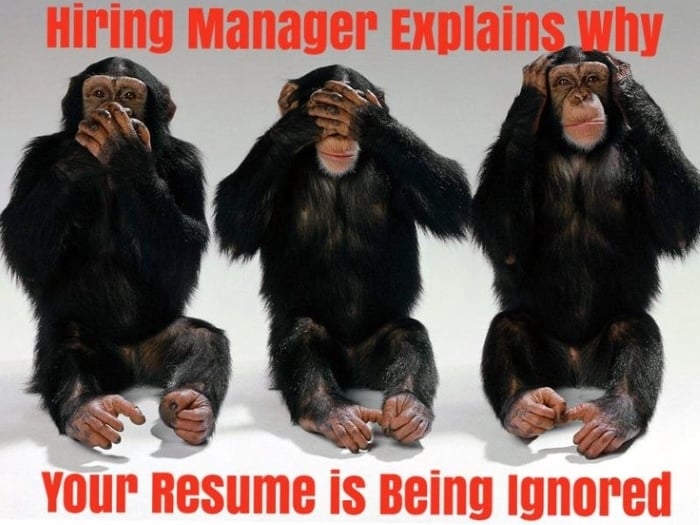
So you have applied to a couple dozen companies in which your applications have been met with silence or a condescending form letter like the following:
Dear applicant,
Thank you for your interest in our company. While your education and qualifications are very impressive, we have chosen another candidate. We will keep your resume on file, and if any other job positions become available we will keep you in mind. On behalf of our company, I thank you for your time, interest, and wish you the best in your future career endeavors.
Sincerely yours,
Hiring Manager
Managing a job board allows us access to hiring managers, and we have asked them for their feedback on what candidates can do better to actually get a foot in the door. The following is a summary of what multiple managers said.
You do not know what a resume is for or how to write one.
Question: What is the purpose of a resume?
Answer: To get a job
Wrong: The purpose of a resume is to get you an interview. Then you can use the interview to get the job.

You send me a super-long resume.
1) While I can appreciate that you are proud of your achievements and do not want to leave anything out, hiring managers typically spend less than 30 seconds on each resume before considering whether to trash it or not.
I appreciate that you work in IT and want to list that you know every programming language known to man, but list the most popular impressive ones that match the position you are applying to. By the way, being able to use MS Office is no longer considered noteworthy.
2) You are a bad communicator – If you send me a loooooong resume, you have angered me and demonstrated that you are a bad communicator. You have just signaled to me that any e-mail you send to me is going to be stupidly long and not to the point. I already get enough of these in my inbox.
If I do take the time to read your long resume and find that you have the skills we need, you had better prove that you are a better communicator when we talk over the phone or in person as I have already dubbed you as someone with poor communication skills
You want any job, not my job.
As you have not tailored your resume or cover letter to match my job, I am pretty certain that you did no research about my company, and you are just applying to any and all jobs.
If my job description lists certain requirements or skills, that is a hint for you to make sure you mention these in your resume. Make a bullet point and explain where you have used or succeeded at that requirement.
What you need in your resume.
Take a look at the following and see if you can improve your resume in the following areas:
Resume Title (online resume): Just like the cover of a book, this must stick out. Would you rather open the resume of “Sales Resume” or “Bilingual Experienced B2B Sales Manager”?
Resume Objective: If you have this on your resume, delete it right now as it can do you no good whatsoever. One of two things will happen:
1) This is either going to be seen as a selfish statement (I want a job where I can me me me me) which is not of any concern to the hiring manager. His or her concern is about what the company needs, not what you want.
2) Objective mismatch: It may be your objective but it may not be the employer’s. Change the “Objective” to “Professional Profile” (or similar term) and give a strong message that summarizes your background and indicates what you are best at.
Why you?: What can you do for us that other candidates cannot? Make the point clear and early in the resume.
Clearly show achievement: Most resumes are filled with “activity” not “achievement.” You are being interviewed because the company needs you to solve a problem. If you can clearly show how you can make or save the company money (show on your resume how you have done this for your other employers), you will get an interview.
Spelling: Please check your spelling. This should be so basic that it need not go on the list, but I always see spelling mistakes. This will eliminate you from contention faster than anything else. An employer does not see this as a spelling mistake, it thinks “If this person is so careless to make such a rudimentary mistake on a document than can improve his/her life, we are going to be shown even less care.”
You do not have the skills or meet the requirements for the job.
By all means, stretch yourself and take on a challenging role. Hopefully you are smart enough to know the differences between absolute requirements and preferences.
If there is a job on a U.S. military base in Japan, the employee may be required to have a U.S. passport or the person cannot do the job. It does not matter how much experience, motivation or skill the job applicant has. If you do not have a U.S. passport, you cannot do the job. It is not discrimination, but rather the reality of the position.
If you are applying for a translator position, be prepared to translate there in the interview. Do not waste either of our time by applying for a job that you vaguely can do.
But how do I get experience if no one will hire me?
If you fall short of the requirements, be up front and let me know. Mention that you are willing to take a pay cut or a more junior role to learn, and I may just take a chance with you. Do not wait for the interview to tell me that as I now see you as under-qualified and have not been truthful. Mention this in the resume and/or cover letter.
If my position requires you to speak business level Japanese having N2 certification, I would certainly interview someone that mentions this in the cover letter “While I do not speak Japanese at the N2 level as required, I passed the N3 test last year; I am currently enrolled in formal Japanese classes; and I expect to be obtain this level later this year…” In doing so you have just shown that you have self-motivation and are close enough to take a chance on.
Do not send out 1,000 resumes.
Unless you just want any job, sending out more applications does not increase your chances of getting hired. Sending out better applications does. If an employer notices that you have carpet-bombed every job they have online, it will blacklist you.
Also when you use the “apply-to-everything” method, you are going to make mistakes. Employers can tell a form letter from a cover letter where thought was given. This is especially true when the job seeker forgets to change company names and details of the position. Applying for everything makes your search sloppy, so use the same amount of time and make each application count.
Happy job hunting. Employers want to hire someone who will make their lives easier. Keep this in mind when writing your resume and cover letter, and you should be just fine.















